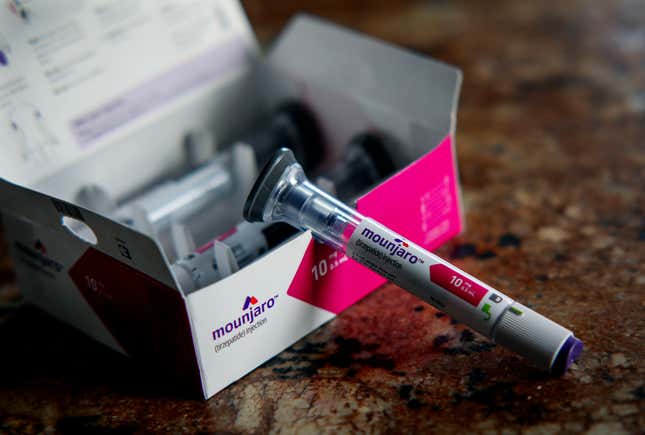
In This Story
Eli Lilly’s blockbuster diabetes and weight loss drugs Mounjaro and Zepbound were found to be more effective at helping patients lose weight than its rival Novo Nordisk’s medications, according to a new study published Monday in JAMA Internal Medicine.
The analysis is one of the first direct comparisons of the competing weight loss drugs.
Researchers from Truveta, a health care data firm, analyzed electronic health records of 41,000 patients who were overweight or obese and were prescribed, for the first time, either tirzepatide — which is the active ingredient in Mounjaro and Zepbound — or semaglutide, the active ingredient in Ozempic and Wegovy.
The study tracked the weight loss for these patients at three, six and 12 months after starting their treatments.
Patients who took tirzepatide lost an average of 5.9% of their body weight after three months, 10.1% after six months, and 15.3% after 12 months.
For comparison, patients who took semaglutide lost an average of 3.6% of their body weight after three months, 5.8% after six months, and 8.3% after 12 month.
Accounting for individual risk factors, patients on tirzepatide were three times more likely to lose at 15% of their body weight compared to patients taking semaglutide.
Skyrocketing sales of these drug have turned Novo Nordisk and Eli Lilly into the largest pharmaceutical companies in the world by market cap. Both tirzepatide and semaglutide belong to a class of drugs that mimic a hormone, GLP-1, that regulates blood sugar and suppresses appetite. In addition, tirzepatide mimics a hormone called GIP, which also helps with weight loss.
Novo Nordisk stock slid 2% on Tuesday a day after the study was published.
“While lowering body weight is an important goal of obesity management, it is important to also consider other needs when choosing a treatment,” a Novo Nordisk spokesperson Quartz in an emailed statement. “Only Wegovy is proven to both help adults with obesity lose excess body weight and keep it off and reduce the risk of major adverse cardiovascular events in adults with known heart disease and either obesity or overweight.”
The spokesperson also noted that the study had several limitations including that it did not exclude patients with type 2 diabetes, who may experience weight loss effects differently than patients without diabetes. The study also did not provide information regarding the doses patients were taking.
Eli Lilly did not immediately respond to a request for comment.